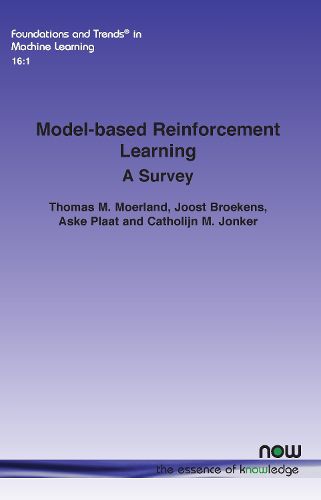Readings Newsletter
Become a Readings Member to make your shopping experience even easier.
Sign in or sign up for free!
You’re not far away from qualifying for FREE standard shipping within Australia
You’ve qualified for FREE standard shipping within Australia
The cart is loading…






This title is printed to order. This book may have been self-published. If so, we cannot guarantee the quality of the content. In the main most books will have gone through the editing process however some may not. We therefore suggest that you be aware of this before ordering this book. If in doubt check either the author or publisher’s details as we are unable to accept any returns unless they are faulty. Please contact us if you have any questions.
Sequential decision making, commonly formalized as Markov Decision Process (MDP) optimization, is an important challenge in artificial intelligence. Two key approaches to this problem are reinforcement learning (RL) and planning. This monograph surveys an integration of both fields, better known as model-based reinforcement learning. Model-based RL has two main steps: dynamics model learning and planning-learning integration. In this comprehensive survey of the topic, the authors first cover dynamics model learning, including challenges such as dealing with stochasticity, uncertainty, partial observability, and temporal abstraction. They then present a systematic categorization of planning-learning integration, including aspects such as: where to start planning, what budgets to allocate to planning and real data collection, how to plan, and how to integrate planning in the learning and acting loop.
In conclusion the authors discuss implicit model-based RL as an end-to-end alternative for model learning and planning, and cover the potential benefits of model-based RL. Along the way, the authors draw connections to several related RL fields, including hierarchical RL and transfer learning. This monograph contains a broad conceptual overview of the combination of planning and learning for Markov Decision Process optimization. It provides a clear and complete introduction to the topic for students and researchers alike.
$9.00 standard shipping within Australia
FREE standard shipping within Australia for orders over $100.00
Express & International shipping calculated at checkout
This title is printed to order. This book may have been self-published. If so, we cannot guarantee the quality of the content. In the main most books will have gone through the editing process however some may not. We therefore suggest that you be aware of this before ordering this book. If in doubt check either the author or publisher’s details as we are unable to accept any returns unless they are faulty. Please contact us if you have any questions.
Sequential decision making, commonly formalized as Markov Decision Process (MDP) optimization, is an important challenge in artificial intelligence. Two key approaches to this problem are reinforcement learning (RL) and planning. This monograph surveys an integration of both fields, better known as model-based reinforcement learning. Model-based RL has two main steps: dynamics model learning and planning-learning integration. In this comprehensive survey of the topic, the authors first cover dynamics model learning, including challenges such as dealing with stochasticity, uncertainty, partial observability, and temporal abstraction. They then present a systematic categorization of planning-learning integration, including aspects such as: where to start planning, what budgets to allocate to planning and real data collection, how to plan, and how to integrate planning in the learning and acting loop.
In conclusion the authors discuss implicit model-based RL as an end-to-end alternative for model learning and planning, and cover the potential benefits of model-based RL. Along the way, the authors draw connections to several related RL fields, including hierarchical RL and transfer learning. This monograph contains a broad conceptual overview of the combination of planning and learning for Markov Decision Process optimization. It provides a clear and complete introduction to the topic for students and researchers alike.